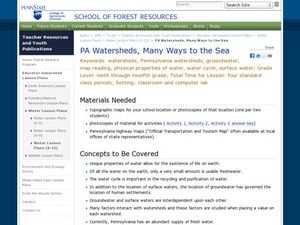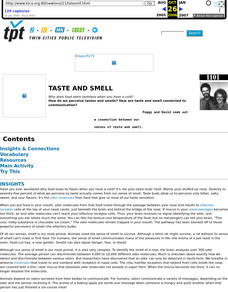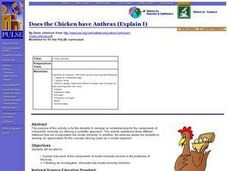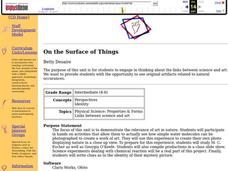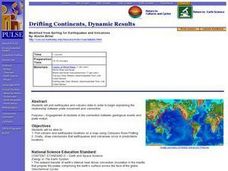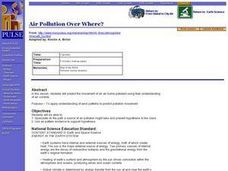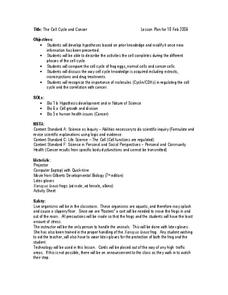Curated OER
How do plant & animal cells make and use energy?
Pupils show the relationship between the need for plants to undergo photosynthesis in order to generate oxygen. They see the flaws associated with this thinking because of the lack of CO2 and H2O and lack of sufficient gravity in order...
Curated OER
Air and Water in the Environment
Second graders participate in a three part lesson in which they identify and describe forms of moisture in the environment. Part one of the lesson involves the three stages of the water cycle, part two focuses on creating humidity by...
Curated OER
PA Watersheds, Many Ways to the Sea
Students examine the water cycle and the factors that interact with watersheds. In this watersheds lesson students describe the purification process, trace the flow of infiltrate water through aquifers, and research the Internet to...
Curated OER
What's the Big Deal?
Students define terms and describe where they are found and formed. In this methane lesson students complete an activity and describe ways in which methane hydrates impact our lives.
Curated OER
Enzymes in Action: An Inquiry Approach to the Effects of Enzymes
Students experiment with enzymes as key components of chemical reactions in all living things through this series of lessons.
Curated OER
Vibrations
Sixth graders use rubber bands, textbooks, pencils, rulers and yo-yos to experiment with the concept of vibrations. They observe changes in pitch according to the speed of vibrations and record their observations in a journal.
Curated OER
Putting on Mass: Just how do Trees grow?
Students articulate an explanation of photosynthesis. They identify problems they have with comprehension of how a plant gains mass. Students describe a historical experiment.
Curated OER
Taste and Smell
Students experiment to determine classmates taste and smell to find out which sends the clearest message to the brain.
Curated OER
Does the Chicken have Anthrax (Explain I)
Young scholars explain how each of the components of innate immunity function in the protection of the body. Following an investigation, they articulate how innate immunity functions.
Curated OER
Water Quality Monitoring
Students comprehend the four parameters of water quality. They perform tests for salinity, dissolved oxygen, pH and clarity or turbidity. Students comprehend why scientists and environmental managers monitor water uality and aquatic...
Curated OER
It's the Slime Time
High schoolers experiment to understand the basic concept of polymerization and to understand the dissolution theory. Student experiment with polymers to understand its behavior and the mechanical behavior of polymer networks.
Curated OER
DNA and RNA
Tenth graders research the history and discovery of DNA. Using their text, they label a basic DNA structure and the composition of genes. They explain how RNA and DNA differ from one other and discuss the processes of transcription and...
Curated OER
Water Chemistry
Students engage in a lesson that is concerned with the concept of water chemistry. They conduct research using a variety of resources. Students also consider an experiment to observe how water has the abiility to exist as three different...
Curated OER
Who Stole My Salad?
Eighth graders explain how protein is made in the cell. For this biology lesson, 8th graders translate RNA and DNA using an internet database. They determine the thief based on evidence collected.
Curated OER
GRAPH-A-TROSS
Students graph many sets of data from the Albatross Project including, flight distances, flight destinations, time between feedings, weight gain of the baby albatross, hatching and fledging dates
Curated OER
Earth & Space Science: Holding it Together
Pupils estimate how many drops of water can fit onto the surface of a penny and then test their hypothesis to find out. They also experiment with bubbles.
Curated OER
Urban Impact on Chollas Creek (California): A Field Study
Students, in groups, take samples from a creek and keep a field journal on their samples. They also perform tests on their samples.
Curated OER
Extraction of DNA from White Onion
High schoolers conduct lab test with minced onion to determine where chromosonal DNA is located within the cell, and whether or not it can be extracted.
Curated OER
On the Surface of Things
Students create a Claris slide shows from pictures they have taken of items close-up in nature after studying the works of M.C. Escher and Georgia O'Keefe. Slide shows includes captions for clues to the identity of their nature picture.
Curated OER
Drifting Continents, Dynamic Results
High schoolers plot earthquake and volcano data using a Compass Rose Plotting. They explain the relationship between plate movement and connection. They draw conclusions that earthquakes and volcanoes occur in predictable locations.
Curated OER
Fallout!
High schoolers plot the locations of fallout from two disasters that polluted much of the world's air. They plot the ash fallout from the 1980 Mt. St. Helen's eruption to see what the wind patterns in the United States look like overall....
Curated OER
Air Pollution Over Where?
Students predict the movement of an air borne pollutant using their understanding of air currents. They determine which governments and/or communities should be contacted to be forewarned. They also explore the properties of their...
Curated OER
The Cell Cycle and Cancer
Students compare and contrast the cell cycle of frog eggs, normal cells, and cancer cells. They watch a video about early development of the frog embryo, generate a hypothesis in small groups, and listen to a teacher-led lecture. ...
Curated OER
The Living Environment
Ninth graders study the work of Alice Huang and complete activities on mutations. In this investigative lesson students complete several activities and discuss their findings at the end.
Other popular searches
- Life Molecules
- Organic Molecules of Life
- Basic Molecules of Life
- Molecules of Life Lessons
- Atoms Molecules Life
- The Molecules of Life


